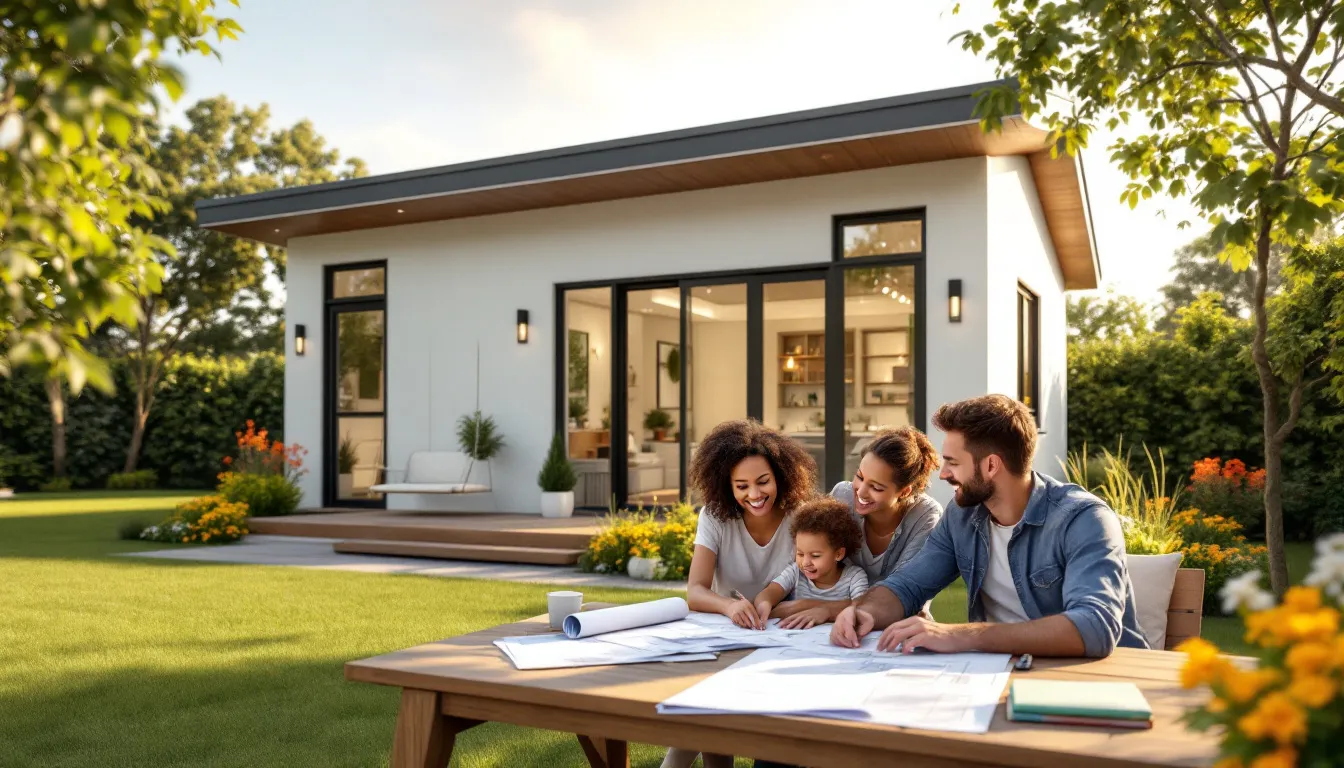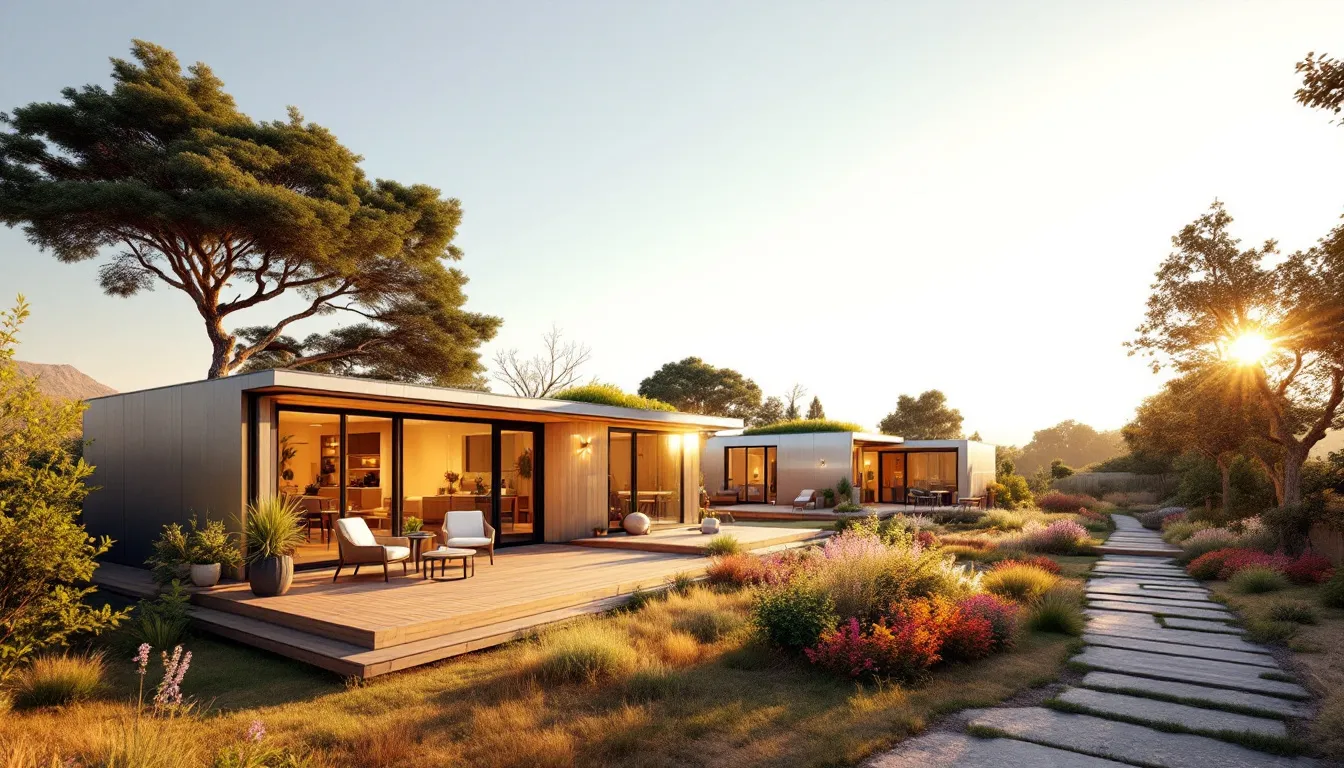Picking the perfect ADU size is crucial. Here's what you need to know:
- Most ADUs range from 400 to 1,200 square feet
- The sweet spot is typically 600 to 1,200 square feet
- ADUs under 750 square feet often have easier permitting and lower fees
- Average cost: $150 to $300 per square foot
Key factors in choosing ADU size:
- Local regulations
- Available space
- Intended use
- Budget
| ADU Size (sq ft) | Average Cost Range |
|---|---|
| 400 | $60,000–$120,000 |
| 600 | $90,000–$180,000 |
| 750 | $112,500–$225,000 |
| 1,000 | $150,000–$300,000 |
| 1,200 | $180,000–$360,000 |
Size recommendations by use:
- Family housing: 700-1,200 sq ft
- Rental unit: 500-800 sq ft
- Guest house/office: 400-600 sq ft
Remember: Smart design can make smaller spaces feel larger and more functional.
Related video from YouTube
ADU Size Rules and Limits
Planning an ADU? You need to know the size rules. Let's break it down.
Maximum Size Limits
California sets the baseline, but your city might tweak these:
| ADU Type | Max Size |
|---|---|
| Detached | 1,200 sq ft |
| Attached | 50% of main house or 800 sq ft (whichever is larger) |
| Junior (JADU) | 500 sq ft |
But here's the catch: many cities go smaller. For example:
- Los Angeles: 1,200 sq ft for detached, 50% of main house for attached
- San Francisco: 850 sq ft (1-bed), 1,000 sq ft (2-bed)
- Santa Monica: 800 sq ft (lots under 6,000 sq ft), up to 1,200 sq ft (larger lots)
Always double-check with your local planning department. Rules change, and you don't want surprises.
Height and Distance Rules
How tall? How close to the property line? Here's the scoop:
- Height: Usually 16 feet for single-story. Some areas allow up to 25 feet for two-story ADUs.
- Setbacks: State says 4 feet from side and rear. But some cities (like San Diego) have cut this to 0 feet in some cases.
"Setback requirements in California are generally 4 feet from side and rear property lines. Some cities have tweaked this." - California Department of Housing and Community Development
Minimum Size Rules
Yes, there's a "too small" for ADUs:
- California minimum: 150 square feet
- Some cities (like San Francisco and Oakland) stick to this 150 sq ft minimum
Pro tip: ADUs under 750 square feet dodge some local impact fees. Could save you a bundle.
When planning, keep these rules in mind. They're not just about following the law - they help create a livable space. And remember, smart design can make even a small ADU feel roomy.
Finding the Right ADU Size
Picking the perfect size for your ADU is key. Let's dive into how to nail down the ideal square footage for your project.
Check Your Lot Size
Your property's size is a big deal when it comes to ADU options. Here's what to look at:
- Measure your lot and spot potential ADU locations
- Know the setback rules (California usually wants 4-foot side and rear setbacks, but check local laws)
- Don't forget about your main house, garage, and other buildings
"About 30% of our clients build ADUs for extended family, so they go bigger - think 700 to 1,200 sq ft", says Leah Kabli from THE BEST ADU BUILDERS.
Set Your Budget
Your wallet has a lot to say about your ADU size. Here's a quick look at costs:
| ADU Size (sq ft) | Estimated Cost Range |
|---|---|
| 400 | $60,000 - $120,000 |
| 600 | $90,000 - $180,000 |
| 750 | $112,500 - $225,000 |
| 1,000 | $150,000 - $300,000 |
| 1,200 | $180,000 - $360,000 |
Want to save some cash? Keep your ADU under 750 square feet. You'll pay less in impact fees and have an easier time with permits.
Plan Your ADU Use
What's your ADU for? That'll help decide its size:
Renting it out? 500-800 sq ft is often the sweet spot for making money. Housing family? Go bigger with 700-1,200 sq ft. Need a home office or studio? You can get by with 150-300 sq ft.
Here's a real-world example: In Downtown Long Beach, a 525 sq ft studio ADU rents for $2,203 per month. That's $4.19 per square foot!
Make the Most of Space
Smart design can make a small ADU feel big:
- Mix living and dining spaces
- Use walls for shelves and cabinets
- Big windows = more light and space
Here's the thing: Good design beats size every time. A well-planned 500 sq ft ADU can feel way better than a sloppy 800 sq ft one.
Common ADU Sizes and Layouts
Let's look at the most popular ADU sizes and layouts. From cozy studios to spacious two-bedroom units, we'll cover what you need to know to pick the right option for your needs and space.
Studio ADUs (350-500 sq ft)
Studio ADUs are small but mighty. They're great for singles, couples, or as guest suites.
- Size: 350-500 sq ft
- Cost in California: $175,000 to $350,000
What you'll typically find in a studio ADU:
- Open living/sleeping area
- Small kitchen
- Full bathroom
- Smart storage solutions
Take the "ADU Studio plan with luxury bathroom – 003-118". It's just 350 sq ft but feels like a hotel room. It even has a separate tub and shower, making it perfect for adult-only vacation rentals.
"In studio ADUs, it's all about smart design. We focus on natural light and multi-functional spaces to make 350 sq ft feel bigger than it is", says Sarah Chen from ModernADU Solutions.
1-Bedroom ADUs (500-700 sq ft)
Want more privacy? A one-bedroom ADU might be your answer. They're great for long-term rentals or in-law suites.
- Size: 500-700 sq ft
- What's inside: Separate bedroom, living area, kitchen, and bathroom
Here's a rough breakdown of the space:
| Room | Typical Size (sq ft) |
|---|---|
| Bedroom | 120-150 |
| Living Area | 200-250 |
| Kitchen | 70-100 |
| Bathroom | 40-50 |
Want to add some outdoor living without increasing your square footage? Check out floor plans with a porch, like the "1 bedroom ADU floor plan with porch – 003-179".
2-Bedroom ADUs (700-1,000 sq ft)
Got a small family or need a home office? A two-bedroom ADU might be just the ticket.
- Size: 700-1,000 sq ft
- What's inside: Two bedrooms, living area, full kitchen, often 1.5 bathrooms
The "2 Bedroom ADU Floor Plan – 728-1904" is a great example. It squeezes two bedrooms into just 480 sq ft. It's perfect if you want to maximize rental income or house extended family.
Mixed-Use ADUs (800-1,200 sq ft)
Mixed-use ADUs are the Swiss Army knives of living spaces. They can be a home office, guest suite, and rental unit all rolled into one.
- Size: 800-1,200 sq ft
- What's inside: Flexible spaces you can change as needed
Here's a smart idea: Look into "ADU above garage floor plans". You can turn these into duplex ADUs with two separate rental units, really making the most of your property.
sbb-itb-4e754d1
Smart Space Planning
In ADU design, every inch counts. Here's how to make your space feel open and organized:
Room Size Guide
When planning your ADU, keep these typical room sizes in mind:
| Room Type | Size (sq ft) |
|---|---|
| Bedroom | 120-150 |
| Living Area | 200-250 |
| Kitchen | 70-100 |
| Bathroom | 40-50 |
These are just guidelines. Your needs and local rules might change things up.
Storage Tips
Smart storage can transform your ADU. Try these:
Use vertical space. Floor-to-ceiling shelves? Yes, please. They're storage gold.
Hidden storage is key. That space under the stairs? Turn it into drawers or a mini closet.
Multi-functional furniture is your friend. Think storage ottomans or beds with built-in drawers.
Sarah Chen from ModernADU Solutions says:
In studio ADUs, we focus on smart design. Natural light and multi-functional spaces can make 350 sq ft feel much bigger than it is.
Rooms That Do More
In ADUs, rooms need to multitask. Here's how:
Living room/office combo? Use a fold-down desk.
Bedroom/guest room? Try a Murphy bed or a daybed.
Kitchen/dining area? Get a rolling kitchen island. It's extra counter space AND a dining table.
Using Natural Light
Natural light is your secret weapon. It makes spaces feel bigger. How to use it:
Big windows or sliding glass doors? They're light magnets.
Mirrors are magic. They bounce light around and make spaces feel larger.
Light, neutral colors on walls and floors? They boost brightness.
Here's the kicker: With smart planning, a 500 sq ft ADU can feel as roomy as a place twice its size. It's all about design smarts.
Getting Help from ADU Experts
Building an ADU isn't a one-person job. You need pros on your side. Here's how to team up with experts who can turn your ADU plans into reality.
Find ADU Builders
First up: you need a solid builder. Here's how:
- Use platforms like THE BEST ADU BUILDERS. They've got a pre-vetted list of ADU pros.
- Check reviews and portfolios. Look for builders with ADU experience.
- Get at least three quotes to compare.
When reviewing quotes, make sure you're comparing apples to apples. Some builders include permits in their quote, others don't.
Choose Design-Build Teams
Want to make your ADU journey smoother? Think about a design-build team. Here's why:
| Why Choose Design-Build Teams? |
|---|
| Single point of contact |
| Better communication |
| Faster project completion |
| Often more cost-effective |
Leah Kabli from THE BEST ADU BUILDERS says:
"About 30% of our clients build ADUs for extended family, so they go bigger - think 700 to 1,200 sq ft. A design-build team can help tailor the space to these specific needs."
Get Permit Help
Permits can be a pain, but your builder should handle them. Here's what to expect:
Good ADU builders know local rules inside out. They'll handle permit applications, saving you headaches. Some even guarantee permit approvals.
Just remember: permitting takes time. A good contractor will factor this into your timeline.
Size Planning Help
Picking the right ADU size is key. Here's how experts can help:
1. Site evaluation: They'll check your property to see how big you can go.
2. Needs analysis: They'll help balance your wants with what's doable and allowed.
3. Budget considerations: Experts can guide you on size options that fit your wallet. ADUs typically cost $100 to $300 per square foot.
4. Future-proofing: They'll help you think ahead about how your ADU needs might change.
Working with ADU experts isn't just about building - it's about building smart. They'll help you dodge costly mistakes and create an ADU that really works for you.
Next Steps for Your ADU Project
You've got the basics down. Now let's get your ADU project moving. Here's your game plan:
1. Define Your ADU Purpose
Why are you building an ADU? Your answer shapes everything else.
| Purpose | Typical Size (sq ft) |
|---|---|
| Rental Income | 500-800 |
| Family Housing | 700-1,200 |
| Home Office/Studio | 150-300 |
2. Research Local Regulations
Every city's different. Dig into your local rules:
- Size limits
- Setbacks
- Parking
- Owner occupancy
3. Assess Your Property
Take a hard look at your lot. Think about:
- Space for the ADU
- Utility access
- Potential hurdles (slopes, trees)
4. Set Your Budget
Be real about costs:
- ADUs? $100 to $300 per square foot
- 500 sq ft at $250/sq ft = $125,000
- Don't forget utilities, permits, and design
5. Get Pre-Approved for Financing
Need money? Start now. Get pre-approved to know your limits.
6. Hire an ADU Expert
Don't DIY this. Find a pro who knows ADUs cold.
"About 30% of our clients build ADUs for family. They go bigger - 700 to 1,200 sq ft. A design-build team can nail those specific needs." - Leah Kabli, THE BEST ADU BUILDERS
7. Create a Preliminary Design
Work with your designer. Think about:
- Size and layout
- Storage
- Multi-use spaces
- Natural light
8. Submit for Permits
Get your paperwork going ASAP. Permits take time.
9. Plan for Construction
Brace yourself:
- ADU build? 6-9 months
- Whole process? 12-18 months
- Expect delays (materials, weather)
10. Stay Flexible
Plans change. Be ready to pivot on design or timeline.
FAQs
What is the maximum size for an ADU?
In California, detached ADUs can be up to 1,200 square feet. But there's more to it:
| ADU Type | Maximum Size |
|---|---|
| Detached (1 bedroom or less) | 800 sq ft |
| Detached (2+ bedrooms) | 1,000 sq ft |
| Detached (any number of bedrooms) | 1,200 sq ft |
Local rules can vary, but they MUST allow:
- Up to 850 sq ft for studio/one-bedroom ADUs
- Up to 1,000 sq ft for two-bedroom ADUs
For example, Los Angeles caps detached ADUs at 1,200 sq ft or 50% of the main house size. San Francisco limits one-bedroom ADUs to 850 sq ft and two-bedroom ADUs to 1,000 sq ft.
What is the minimum square footage for an ADU in California?
The minimum size for ANY ADU in California is 150 square feet. This applies to detached ADUs, attached ADUs, converted garages, and even Junior ADUs (JADUs).
Here's the kicker: There's no state-mandated minimum lot size for building an ADU. Local governments can't impose one either.
Thinking of going smaller? Keep these points in mind:
- You can ask for permission to build below 150 sq ft, but it's not guaranteed.
- Some cities might have their own size rules. San Francisco and Oakland, for instance, stick to the 150 sq ft minimum.
"The California State code says that all ADUs must be at least 150 square feet regardless of the type of ADU they are", according to the California Department of Housing and Community Development.


